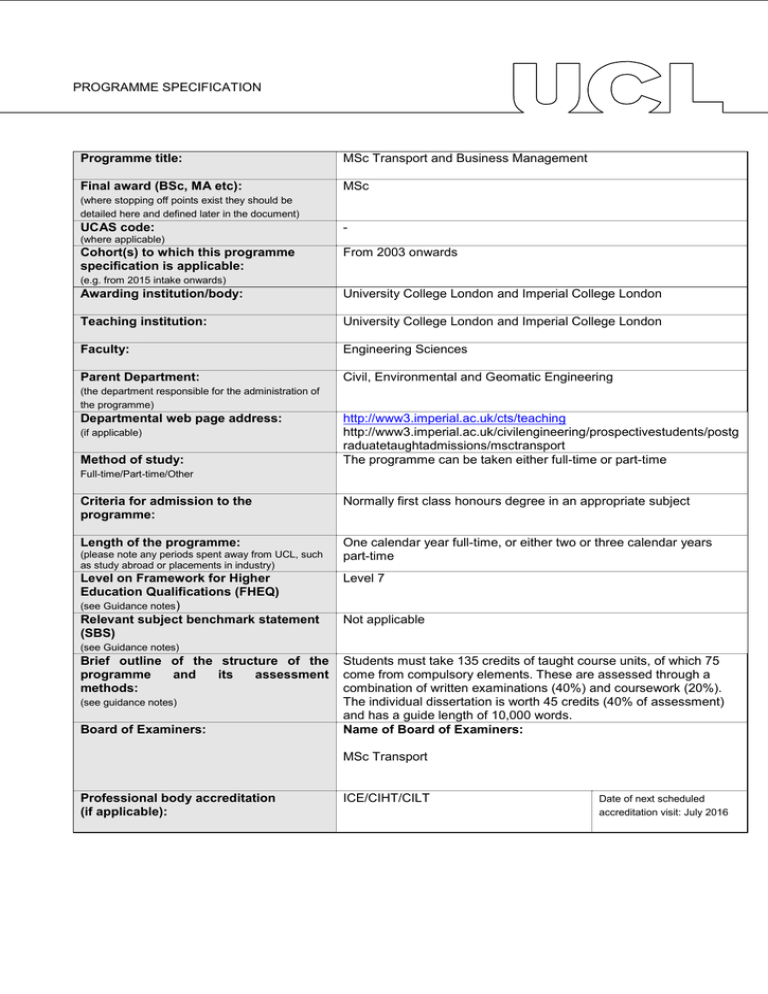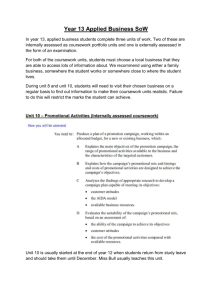Programme title: Final award (BSc, MA etc): UCAS code:
advertisement

PROGRAMME SPECIFICATION Programme title: MSc Transport and Business Management Final award (BSc, MA etc): MSc (where stopping off points exist they should be detailed here and defined later in the document) UCAS code: - (where applicable) Cohort(s) to which this programme specification is applicable: From 2003 onwards (e.g. from 2015 intake onwards) Awarding institution/body: University College London and Imperial College London Teaching institution: University College London and Imperial College London Faculty: Engineering Sciences Parent Department: Civil, Environmental and Geomatic Engineering (the department responsible for the administration of the programme) Departmental web page address: (if applicable) Method of study: http://www3.imperial.ac.uk/cts/teaching http://www3.imperial.ac.uk/civilengineering/prospectivestudents/postg raduatetaughtadmissions/msctransport The programme can be taken either full-time or part-time Full-time/Part-time/Other Criteria for admission to the programme: Normally first class honours degree in an appropriate subject Length of the programme: One calendar year full-time, or either two or three calendar years part-time (please note any periods spent away from UCL, such as study abroad or placements in industry) Level on Framework for Higher Education Qualifications (FHEQ) (see Guidance notes) Relevant subject benchmark statement (SBS) Level 7 Not applicable (see Guidance notes) Brief outline of the structure of the programme and its assessment methods: (see guidance notes) Board of Examiners: Students must take 135 credits of taught course units, of which 75 come from compulsory elements. These are assessed through a combination of written examinations (40%) and coursework (20%). The individual dissertation is worth 45 credits (40% of assessment) and has a guide length of 10,000 words. Name of Board of Examiners: MSc Transport Professional body accreditation (if applicable): ICE/CIHT/CILT Date of next scheduled accreditation visit: July 2016 EDUCATIONAL AIMS OF THE PROGRAMME: The programme aims to: Provide a systematic understanding of the causes and motivations of personal travel and good movement and of the means by which movement takes place and how this relates to business management; Provide a thorough grounding in techniques for analysing transport problems and developing and implementing policies and measures for resolving such problems, particularly in the context of business management; Develop appreciation of the importance and methods of evaluating transport projects, plans and policies, taking into account the political, social, environmental, commercial and financial issues involved particularly in the context of business management; Foster the acquisition and implementation of broad design, research and analytical skills related to transport and business management; Attract highly motivated students irrespective or race, gender, background and physical disability, from the UK and overseas; Develop new areas of teaching in response to the advance of scholarship and the needs of the community including vocational training; Produce graduates equipped for employment in transport, in the private sector, the public sector and nongovernmental organisations in the UK and overseas. PROGRAMME OUTCOMES: The programme provides opportunities for students to develop and demonstrate knowledge and understanding, qualities, skills and other attributes in the following areas: A: Knowledge and understanding Knowledge and understanding of: 1. A selection of the major topics in the field of transport studies and business management, their recognition and underlying fundamental principles; 2. Research techniques including information retrieval, experimental design and statistics, modelling and safety; 3. The essential facts, concepts, principles and theories relevant to the student’s chosen area of research; 4. Management and communication skills, including problem definition, project design, decision processes, teamwork, written and oral reports, scientific publications. Teaching/learning methods and strategies: Acquisition of knowledge and understanding is through a combination of lectures, seminars, computer-based work, and coursework. Throughout the students are encouraged to undertake independent reading both to supplement and consolidate what is being taught and to broaden their individual knowledge and understanding of the subject. Assessment: Assessment of the knowledge base is through a combination of unseen written examinations and assessed coursework as well as an individual literature review, presentation and dissertation focussing on the student’s individual special study project. B: Skills and other attributes Intellectual (thinking) skills: 1. Analyse and solve problems using a multidisciplinary approach, applying professional judgements to balance costs, benefits, safety and social and environmental impact; 2. Integrate and critically evaluate information; 3. Formulate, develop and apply appropriate solutions; 4. Plan, conduct and write up a programme of individual research. Teaching/learning methods and strategies: Intellectual skills are developed through the teaching and learning methods outlined above Assessment: Assessment is through coursework, unseen written examinations, conceptual design projects, and a research dissertation. C: Skills and other attributes Practical skills (able to): 1. Plan and execute safely a series of experiments or computations; 2. Use laboratory methods or computerbased tools to generate data; 3. Analyse results, determine their strength and validity, and make recommendations; 4. Prepare technical and design reports; 5. Give technical presentations; 6. Use the scientific literature effectively. Teaching/learning methods and strategies: Practical skills are developed through the teaching and learning programme outlined above. Practical experimental or computational skills are developed through project work and coursework, and through interaction with other students and the project supervisor. The preparation of technical and design reports and giving technical presentations are taught and developed through workshops and feedback on written reports and presentations. Use of the scientific literature is developed through lectures, coursework reports and the individual supervised research project. Assessment: Practical skills are assessed where appropriate through the project reports and presentation. D: Skills and other attributes Transferable skills (able to): 1. Communicate effectively through oral presentations, computer processing and presentations, and written reports; 2. Apply knowledge and modelling skills; 3. Management skills: decision processes, objective criteria, problem definition, project design and evaluation needs; 4. Integrate and evaluate information from a variety of sources; 5. Transfer techniques and solutions from one discipline to another; 6. Use Information and Communications Technology; 7. Manage resources and time; 8. Learn independently with openmindedness and critical enquiry; 9. Learn effectively for the purpose of continuing professional development. Teaching/learning methods and strategies: Transferable skills are developed through the teaching and learning programme outlined above. Skill 1 is taught through workshops and feedback on reports and oral presentations. Skill 2 is taught through lectures and practical work and developed, as appropriate, during individual research project. Skills 3 to 5 are developed through project work. Skill 6 is developed through workshops, computer-based exercises, projects and other coursework activities and individual learning. Skill 7 is developed throughout the course within a framework of staged coursework deadlines and the examination system. Although not explicitly taught, skills 8 and 9 are encouraged and developed throughout the course, which is structured and delivered in such a way as to promote this. Assessment: Skill 1 is assessed through written examinations, course work and the oral presentation. Skill 2 is assessed through coursework, written examinations and project work. Skills 3 to 5 are assessed in project work The other skills are not assessed formally. The following reference points were used in designing the programme: the Framework for Higher Education Qualifications: (http://www.qaa.ac.uk/en/Publications/Documents/qualifications-frameworks.pdf); the relevant Subject Benchmark Statements: (http://www.qaa.ac.uk/assuring-standards-and-quality/the-quality-code/subject-benchmark-statements); the programme specifications for UCL degree programmes in relevant subjects (where applicable); UCL teaching and learning policies; staff research. Please note: This specification provides a concise summary of the main features of the programme and the learning outcomes that a typical student might reasonably be expected to achieve and demonstrate if they take full advantage of the learning opportunities that are provided. More detailed information on the learning outcomes, content and teaching, learning and assessment methods of each course unit can be found in the course handbook. The accuracy of the information contained in this document is reviewed annually by UCL and may be checked by the Quality Assurance Agency. Programme Organiser(s) Professor Benjamin Heydecker Name(s): Date of Production: 2003 Date of Review: December 2015 Date approved by Chair of Departmental Teaching Committee: December 2015 Date approved by Faculty Teaching Committee December 2015

